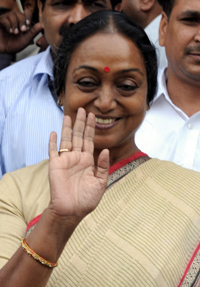|
New
Delhi: Meira
Kumar can get angry, but she never cries.
India’s first woman Speaker, whose
“reed-thin” voice might sound like a squeak compared to predecessor
Somnath Chatterjee’s booming bellow, gave a hint of the steel
beneath her mild demeanour as she took over the task of minding the
House today.
Asked what she was like as a woman,
the 64-year-old countered with a query.
“Are you asking personal questions?”
she shot back.
“Like everybody else,” she added, “I
get angry. But I don’t cry.”
Unruly members, take note.
On her first day, members were on
their best behaviour, congratulating the first woman Speaker and
promising to co-operate with her.
Nine-time CPM MP Basudeb Acharia, who
stood up to offer the Left’s support to the Speaker, had difficulty
shedding a habit of almost 30 years and kept addressing Meira as Sir
till the backbenchers corrected him and he switched to Madam.
Meira, a former diplomat, spoke on a
range of issues, like poverty, exploitation and generational change,
but stressed on consensual politics as she promised to rise above
ideological and partisan interests to uphold the spirit of the
Constitution.
“The meaning of democracy lies in
being compassionate and respectful towards those who don’t agree
with you,” she said, quoting Nehru.
If that came as a balm for the
poll-bruised Opposition, more salve followed. She cautioned the
ruling side that good governance in a country like India was not
possible without constructive co-operation of every member.
In her acceptance speech to the Lok
Sabha and later at her first news conference as Speaker, Meira
showed political correctness and humility. She recalled the legacy
attached to the Speaker’s office — from G.V. Mavalankar, the first
Lok Sabha Speaker, to Chatterjee — and said she felt humbled.
Meira, daughter of the late Dalit
leader Jagjivan Ram, said the choice of a woman for the post was
more than a symbolic gesture. She said the unanimous decision to
elect a woman to run the House, two years after the election of
India’s first woman President, showed the nation’s firm resolve to
empower women.
“We have a long way to go but there is
a genuine intention to make women’s position stronger,” she said.
“Women’s empowerment is not merely a slogan but concrete steps are
being taken in that direction.”
Even on women’s empowerment, her focus
was on consensus. Though every leader who spoke in the Lok Sabha
after her election felt that the jinxed women’s reservation bill
could be headed for a better future, Meira explained the
Constitution couldn’t be amended without consensus.
Asked if women MPs would now get
proper time to speak, she dismissed the suggestion that members got
more or less time because of their gender.
Meira dwelt on poverty and
exploitation and said Independence meant little for a vast majority
of Indians, especially Dalits and tribals, and quoted Gandhi to say
it was pointless if members of Parliament were in disconnect with
the masses.
Pointing out that around 300 new MPs
were “young”, she asked the older MPs to guide them and to give
priority to the aspirations of youth.
The new Speaker showed maturity by
being non-committal on contentious issues like the no-work-no-pay,
diminishing working hours in Parliament and salaries of MPs.
On criminals entering Parliament, she
avoided any idealist posturing. “Everybody wanted to bar criminals
from Parliament,” she said, “and the Election Commission was taking
steps in that direction.”
Asked about her favourite colour,
Meira said: “I like green. I am a green woman.”
Her favourite book, she said, was Kalidas’s Abhigyan Shankuntalam.
“I read it again and again." |









 I
I